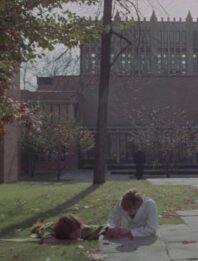
David Cronenberg had to start somewhere with his first go at Crimes of the Future, his second mid-length feature. This iteration’s protagonist is Adrian Tripod (Ronald Mlodzik), a member of the House of Skin, a group of scientists studying dermatology. Tangentially, they’re also studying Rouge’s disease, a disease that kills all sexually mature women and some men. The disease gets its name from Antoine Rouge, the man who, after changing the House’s focus, disappears. During the flm’s beginning, Adrian’s last and only patient (Jon Lidolt) dies. So he decides to visit scientists (including Jack Messinger) who study other departments who also feels Rouge’s disappearance and loss.
There are enough people who write about Cronenberg’s films and how they show his interests. Most of those people wrote about his views on sex, which I did as well. The boss‘ interests are rare enough in that he’s looking within those bodies, a take that I barely see when reading abour Cronenberg. And Mark wrote about Crononberg’s characters in relation to the spaces in which they inhabit. I’ll get to how the original Crimes and how it uses the spaces it captures, but the film, for the most part, belongs to a certain subgenre of science fiction. One that, among many things, deals with the possibility of a future more isolating than the present.
Science fiction is a genre that intimidates directors because of the production value it seems to require. Cronenberg’s early works shows that one can win half of the battle even with a small budget. All one needs is a cast and the space that can look weird enough to suspend disbelief. And now that we’re discussing space, I get defensive whenever I read reviews about how Cronenberg is making one of his locations, the Ontario Science Centre, look drab. I haven’t been there for a while. But I’m specifically defensive towards that museum because it may be gone soon.
But I’ll be fair to the original Crimes‘ haters by agreeing that the movie doesn’t have too much going for it. Weird looking characters can walk around weird looking spaces for so long. Eventually, these characters are going to need to do or say something, but they don’t here. And yes, Cronenberg may not have written dialogue for a few reasons. But the movie’s reliance on narration doesn’t cover up much. So as much as I’d like to defend this, I can’t.
Watch the original Crimes of the Future on MUBI.
- Rated: NR
- Genre: Comedy, Science Fiction
- Directed by: David Cronenberg
- Starring: Jack Messinger, Jon Lidolt, Ronald Mlodzik
- Produced by: David Cronenberg, Stefan Nosko
- Written by: David Cronenberg
- Studio: Emergent Films Ltd.

